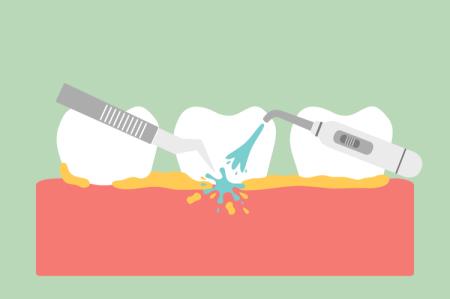The importance of tartar removal
Tartar removal not only reveals your natural beauty but also helps protect your oral health as it can prevent up to 80% oral diseases. If you are still confused and wonder whether getting your tartar removed is a good idea or not, read on to find out!
Why is tartar removal necessary?
Even if you practice good oral hygiene, bacteria still exist in your mouth. Combined with proteins and food additives, they form plaque on your teeth. This plaque buildup lingers on your teeth, hides under the gum lines, and even stick to the filling material your dentist put over your old cavities.
As time goes by, more and more plaque builds up and gets calcified into tartar which is light or deep yellow. Tartar may form above or under your gums, causing diseases of the gums and roots.
Tartar build-up on the gums is not only unsightly but also a home for various bacteria harmful for your oral health. These bacteria may cause irritation and damage to your gums, resulting in gum disease.
This is also the cause of bad breath and other inflammatory conditions responsible for gum redness and inflammation, bleeding, gum recession, loss of alveolar bone, loose teeth, and in the worst case, lost teeth.
Periodical tartar removal is a necessary part of your oral care routine because:
- Although daily brushing may cleanse your mouth, it isn’t able to get rid of all the plaque.
- Tartar may occur at any age and wreak havoc on both oral health and appearance.
- Tartar removal helps eliminate up to 80% of oral diseases such as gum inflammation, periodontitis, pulpitis, etc.

Is tartar removal beneficial?
Tartar removal aims to get rid of plaque and food particles that have been calcified by bacteria, calcium carbonate, and calcium phosphate in saliva, preventing the development of severe oral conditions. These days, tartar removal is a simple and quick procedure, carried out with advanced ultrasonic devices. The procedure takes around 15–30 minutes, depending on the extent of the tartar buildup. Frequent and proper tartar removal is the key to a healthy and beautiful set of teeth. Therefore, tartar removal is greatly beneficial for your oral health.
How often should you have tartar removal?
You shouldn’t get tartar removal too often as it may cause bleeding and other injuries. Only get tartar removal as recommended by your dentist. For example:
- Once every 6 months if you have good oral hygiene, smooth enamel, and little tartar.
- Once every 3–4 months if you frequently smoke, drink coffee and alcoholic beverages, don’t practice good oral hygiene, have rough enamel that easily accumulates plaque.
- Children under 10 years old should have a dental exam and have gentle tartar removal if necessary.
How to prevent plaque and tartar?
In order to preserve the color and the best condition of enamel after shaving, you can follow the suggestions below to help prevent plaque and tartar:
- Do not eat foods that are too sweet
- See your dentist periodically
- Use mouthwash to prevent plaque
- Limit smoking, drinking dark drinks like tea, coffee ...
- Use a soft bristle brush, floss, toothpick to clean teeth.
Most of the time, tartar removal isn’t painful, neither affects the soft tissues nor damage the enamel. However, tooth and gum damages may still occur if the dentist accidentally touches the inner of your cheeks or your tongue. Thus, to minimize pain after tartar removal, you should go for a reputable dental clinic with a team of highly experienced dentists and advanced equipment.
Reference source
Services
Working Time
- Monday - Friday: 08:00 - 19:00
- Saturday: 08:00 - 18:00
- Sunday closed
Contact Info
- Hotline 1: (+84) 908 321 455
- Hotline 2: (+84) 931 857 885
- Mobile: (+84) 8 3925 8778
- Phone: (+84)2 838 258 778
- info@dentalrose.net
- rosedentalclinicvn@gmail.com
 English
English  Tiếng Việt
Tiếng Việt

